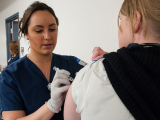Editor's note: This story was revised on Feb 27, 2014, to correct information about the age-groups for which live-attenuated influenza vaccine is recommended in the UK, Canada, Israel, and Germany.
The US Advisory Committee on Immunization Practices (ACIP) today looked at the possibility of preferentially recommending the nasal-spray flu vaccine over injected flu vaccines in children, but deferred any action at least until its next meeting in June.
The ACIP's influenza work group has been comparing the efficacy and safety of live attenuated flu vaccine (LAIV) and inactivated flu vaccine (IIV) but was not prepared to propose a formal recommendation at today's meeting, said Lisa Grohskopf, MD, MPH, of the Centers for Disease Control and Prevention's (CDC's) National Center for Immunization and Respiratory Diseases. She promised that the group would present more information in June.
The committee, which advises the CDC, voted unanimously to reaffirm its existing flu vaccination recommendations, which call for vaccination for essentially everyone over the age of 6 months. The meeting was streamed over the Web.
Healthy children ages 2 to 17 years can receive either LAIV (FluMist) or IIV, Grohskopf noted. "Several studies indicate that LAIV may have advantages for kids," whereas in adults, studies have pointed to similar efficacy for both vaccines or perhaps an advantage for IIV, she said.
Recommendations in other countries
Ruth Karron, MD, chair of the ACIP influenza work group, said Canada, the United Kingdom, Germany, and Israel preferentially recommend LAIV for children in various age ranges (UK, 2 to 18 years; Canada and Israel, 2 to 17; Germany, 2 to 6). Also, Oregon preferentially recommends LAIV for children 2 to 5 years old, while Washington state recommends it for those 2 to 7 years, she said.
Canada updated its recommendations last November to say there's clear evidence that LAIV is better than IIV in 2- to 6-year-olds but that the evidence in older children is less clear, said a Canadian official who attended the meeting.
In a similar vein, a strict meta-analysis of randomized controlled trials, published in The Lancet Infectious Diseases in 2011, concluded that LAIV had an efficacy of 83% in children 6 months to 7 years old but that the trials did not support its efficacy in older children or adults. The researchers did not find any randomized trials supporting the efficacy of trivalent IIV in children ages 2 to 17. The analysis was conducted by the University of Minnesota's Center for Infectious Disease Research and Policy, publisher of CIDRAP News.
Possible concerns
Grohskopf said possible concerns related to a preferential recommendation for LAIV in children include keeping ACIP advice in harmony with that of the American Academy of Pediatrics (AAP), the supply of LAIV, and the safety of quadrivalent (four-strain) LAIV. MedImmune, maker of FluMist, switched to making only a quadrivalent (instead of trivalent) version of the vaccine this year.
AAP experts plan to discuss the issue at a meeting in April, Grohskopf said. An AAP representative at the meeting said AAP officials haven't really discussed the topic yet and don't have a consensus on it at this point.
Jeffrey Duchin, MD, a member of the ACIP's influenza work group, commented, "We're strongly considering a preferential recommendation," and expressed a hope that the AAP will do the same.
"Many of us feel it's long overdue," he added. "We just want our colleagues to understand that it's under serious consideration."
The ACIP heard presentations on the safety of LAIV and IIV, which generally showed little difference between them.
Production capacity
Kathleen Coelingh, a MedImmune representative, reported that the company expects to have adequate production capacity to meet any surge in LAIV demand that could be generated by a preferential ACIP recommendation.
She said MedImmune distributed about 13 million doses of FluMist for the current flu season and expects to make about 24 million doses for next year.
"There's a large amount of unused manufacturing capacity. We have the capacity to make 30 million doses," she told the committee.
She added that the company expects to raise its capacity to 47 million doses by 2016, "which in our estimation would be adequate for everybody who would want to get it."
See also:
Feb 26-27 ACIP meeting agenda
Oct 25, 2011, CIDRAP News story "Strict meta-analysis raises questions about flu vaccine efficacy"






















